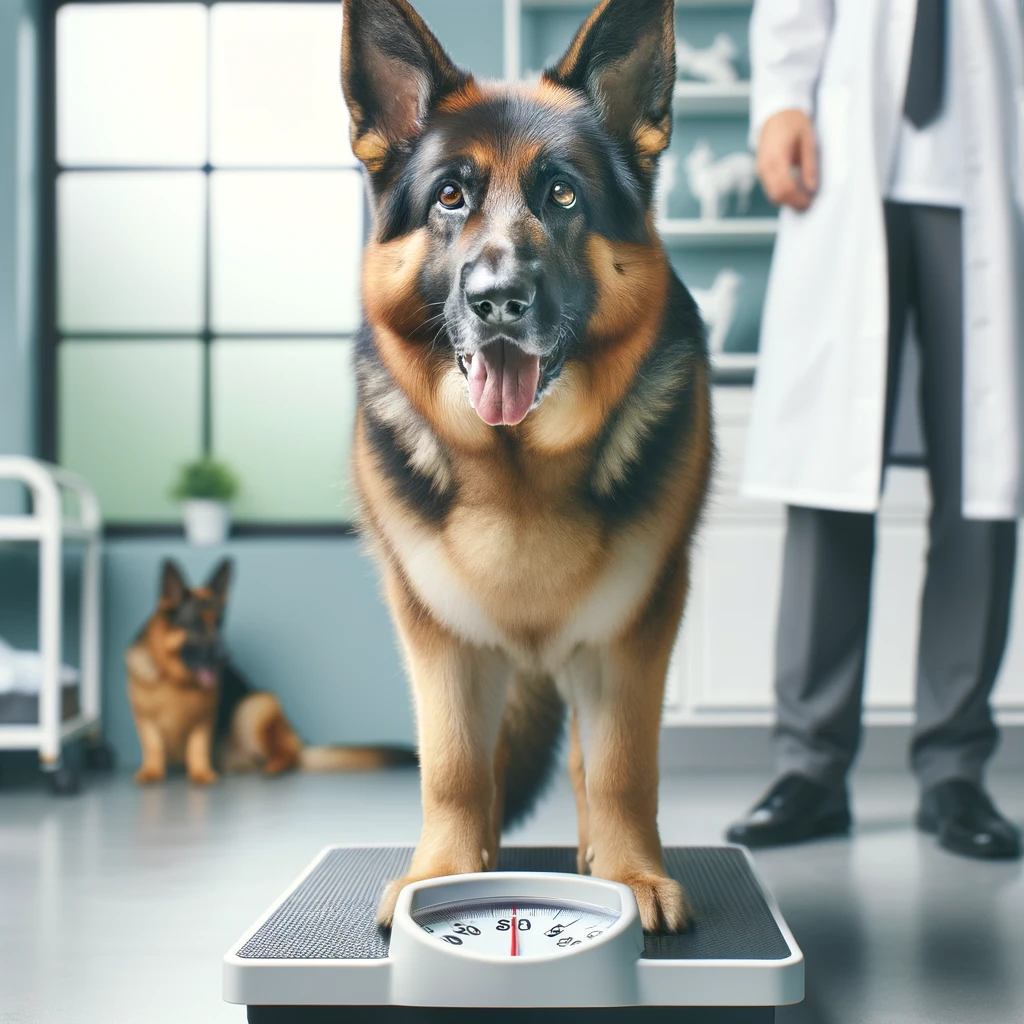How Much Do German Shepherds Weight

Generally, adult male German Shepherds weigh between 65 and 90 pounds (29 and 40 kilograms).
Female German Shepherds are usually lighter, typically weighing between 50 and 70 pounds (22 and 32 kilograms).
These weights are for healthy, well-proportioned dogs and can vary based on diet, exercise, and genetic factors.
German Shepherds’ Weight Chart: Male vs Female
Here is a table detailing the weight of German Shepherds according to their age, with separate columns for males and females:
| Age | Male Weight (lbs/kg) | Female Weight (lbs/kg) |
| 8 weeks | 11-17 lbs / 5-7.7 kg | 9-15 lbs / 4-6.8 kg |
| 4 months | 31-35 lbs / 14-16 kg | 27-32 lbs / 12-14.5 kg |
| 6 months | 49-57 lbs / 22-26 kg | 44-49 lbs / 20-22 kg |
| 1 year | 64-71 lbs / 29-32 kg | 57-62 lbs / 26-28 kg |
| 2 years | 71-84 lbs / 32-38 kg | 62-75 lbs / 28-34 kg |
| Adult | 65-90 lbs / 29-40 kg | 50-70 lbs / 22-32 kg |
Factors Influencing Weight in German Shepherds
Understanding the weight of German Shepherds involves considering several key factors that significantly impact their overall health and physical development.
Various elements play a role in determining the weight of these dogs.
Genetic Factors
Genetics plays a crucial role in a German Shepherd’s weight. Their lineage, including the size and build of their parents, heavily influences their potential size and weight. Some lines are bred for larger frames, while others may be smaller.
Diet and Nutrition
The impact of diet and nutrition on a German Shepherd’s weight cannot be overstated. A balanced diet tailored to their age, size, and activity level is essential for maintaining a healthy weight.
Overfeeding or underfeeding, as well as the quality of the food, can lead to weight issues.
Exercise and Activity Levels
Exercise and activity levels significantly influence a German Shepherd’s weight. These active dogs require regular exercise to maintain a healthy weight.
Lack of physical activity can lead to weight gain, while excessive exercise might cause them to be underweight.
Spaying/Neutering and Weight
Finally, spaying or neutering can also affect a German Shepherd’s weight. These procedures can lead to hormonal changes that might cause weight gain.
Owners must adjust their pet’s diet and exercise regimen post-surgery to manage potential weight changes.
These factors contribute to a German Shepherd’s overall weight and health, highlighting the need for a balanced approach to their care and management.
Weight Differences Between Males and Females
Understanding the weight differences between male and female German Shepherds is crucial for owners to maintain their pet’s health and well-being.
Comparing Weight Ranges
Generally, male German Shepherds are larger and heavier than their female counterparts. Adult males typically weigh between 65 to 90 pounds (29 to 40 kilograms), showcasing a robust and muscular build.
On the other hand, adult female German Shepherds usually weigh lighter, ranging from 50 to 70 pounds (22 to 32 kilograms), and often have a slightly more slender frame.
Reasons Behind the Differences
These weight differences are primarily due to genetic and hormonal factors. Males naturally develop more muscle mass, contributing to their higher weight.
Historically, the roles intended for these dogs, such as herding and protection, may have influenced the breeding practices that emphasized a larger size in males.
Understanding these distinctions is essential for appropriate care, feeding, and exercise regimes tailored to each gender’s needs.
Health Concerns Related to Weight
Understanding the weight-related health concerns in German Shepherds is crucial for their overall well-being.
This segment delves into the potential health issues linked with being either underweight or overweight and guides maintaining an ideal weight.
Addressing Underweight and Overweight Issues
Being underweight in German Shepherds can lead to malnutrition, weakened immunity, and bone health issues.
On the flip side, overweight dogs are at a higher risk of developing joint problems, diabetes, and heart disease. It’s essential to recognize these risks to prevent long-term health complications.
Maintaining an Ideal Weight
A balanced diet and regular exercise are key to ensuring your German Shepherd maintains a healthy weight. It’s important to consult a veterinarian to develop a tailored diet and exercise plan, considering the dog’s age, activity level, and existing health conditions.
Regular check-ups and weight monitoring are vital to keeping your German Shepherd healthy and thriving.
Tips for Managing Your German Shepherd’s Weight
Maintaining a healthy weight in German Shepherds is crucial for their overall health and longevity.
This section provides practical advice on diet, exercise, and the significance of regular veterinary check-ups.
Diet: Balancing Nutrition and Portion Control
A balanced diet is key to managing your German Shepherd’s weight. Opt for high-quality dog food that meets their nutritional needs based on age, size, and activity level.
Be mindful of portion sizes and avoid overfeeding. Treats should be given sparingly, and consider healthier options like carrots or apples.
Exercise: Keeping Your Shepherd Active
German Shepherds are active and intelligent dogs that require regular exercise. Daily walks, play sessions, and mental stimulation through training or puzzle toys are essential.
Exercise not only helps in weight management but also in preventing boredom and behavioral issues.
Regular Vet Check-ups: Monitoring Health and Weight
Regular veterinary visits are important for monitoring your German Shepherd’s weight and overall health.
Your vet can provide specific guidance on dietary needs and exercise regimes and address weight-related health concerns.
These check-ups ensure that your pet remains at an optimal weight, contributing to a happier and healthier life.
Recap
In summary, understanding and managing the weight of German Shepherds is vital for their health and well-being. Genetics, diet, exercise, and regular veterinary care play significant roles in weight maintenance.
Owners can ensure their German Shepherds lead healthy, active lives by emphasizing balanced nutrition and regular physical activity.
This article underscores the importance of responsible pet ownership, where prioritizing health and nutrition is key to nurturing a thriving, happy dog.

I’m Martin, and I grew up in the super cool city of Seattle. You know, the place with all the incredible mountains and forests? Yeah, that’s my playground!
Ever since I was little, I’ve been all about nature. I used to wander around the woods with a notebook, doodling all the cool plants and animals I’d find.
